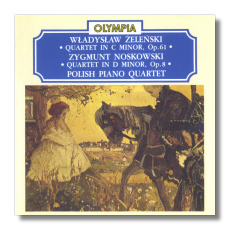
The Internet's Premier Classical Music Source
Related Links
- Latest Reviews
- More Reviews
-
By Composer
-
Collections
DVD & Blu-ray
Books
Concert Reviews
Articles/Interviews
Software
Audio
Search Amazon
Recommended Links
Site News
 CD Review
CD Review
Zelenski / Noskowski

Piano Quartets
- Wladyslaw Zelenski: Piano Quartet in C minor, Op. 61
- Zygmunt Noskowski: Piano Quartet in D minor, Op. 8
Polish Piano Quartet
Olympia OCD381 DDD 72:01
Zelenski and Noskowski are not household names, although the music on this excellent Olympia CD suggests they ought to be much better known. Wladyslaw Zelenski (1837-1921) was for a large part of his long life the director of the Cracow Conservatoire, where he also taught piano and theory; he had a considerable reputation as a pedagogue. Among his works there are four operas, two symphonies, two overtures, a piano concerto, seven cantatas, two masses, songs, a fair amount of music for keyboard (piano and organ), and a considerable quantity of chamber music - including this engaging Piano Quartet. The model is immediately obvious: the work is written in signo Johannis magni. The Brahmsian stamp is clear in the cast of its melodies, the textures of the piano writing, the distribution of the voices - but there are worse models: Brahms was a very great composer, after all. Zelenski's voice may not be entirely individual, but he certainly knew how to use it: this work is expertly put together, with a real sweep that commands the listener's attention at every stage of its four-movement progress. And there are some gorgeous melodies in it, particularly in the "Romanza" that forms the slow movement.
The same is only marginally less true of the structure and tunes in the Piano Quartet by Zygmunt Noskowski (1846-1909), whose name now lives chiefly in the reflected glory of having been Szymanowski's teacher. His catalogue includes three operas and the same number of symphonies, and one of his several symphonic poems, The Steppe, gained a degree of popularity in Poland. There are also a number of other stage pieces (including a ballet, The Feast of Fire), cantatas, piano music, songs, three string quartets and this extremely attractive Piano Quartet. It has slightly less character than its companion on this CD, but it is as finely crafted, and will win listeners over very swiftly.
Both composers were alert ante diem to Hans Keller's strictures about the difficulties of blending the very different natures of piano and string sound, and took advantage of that disparity. As a result these Quartets are also miniature concertos, with textures that thus impart size to some already impressive melodic ideas.
The performances are first-rate. I hadn't come across the Polish Piano Quartet before, but they are plainly musicians of outstanding ability. There is a forthright naturalness to their playing which sits very well with the open-hearted character of the music. The recorded sound, too, is very good indeed: warm, full-bodied, simultaneously clear and powerful. Altogether, then, a disc well worth investigating. And I hope that Olympia will be doing some more exploring in the worklists of both composers, Zelenski in particular.
Copyright © 1996/1998, Martin Anderson


















